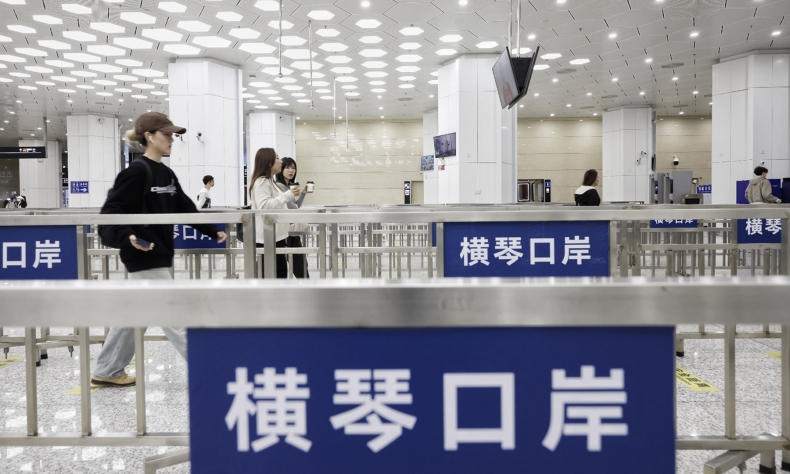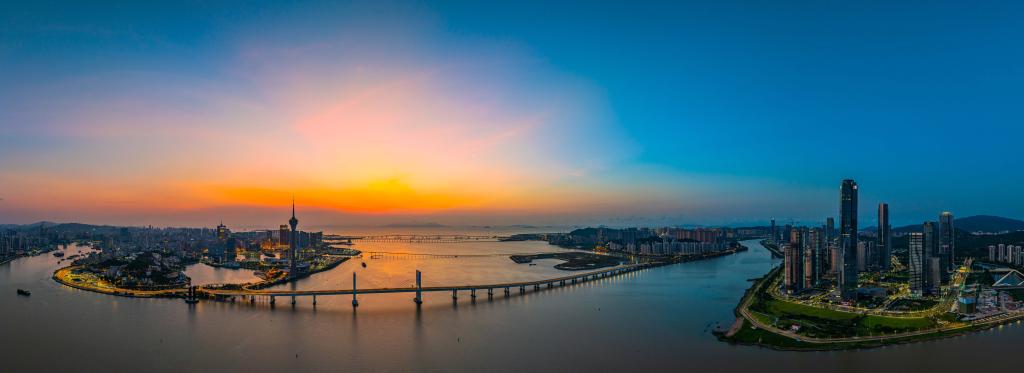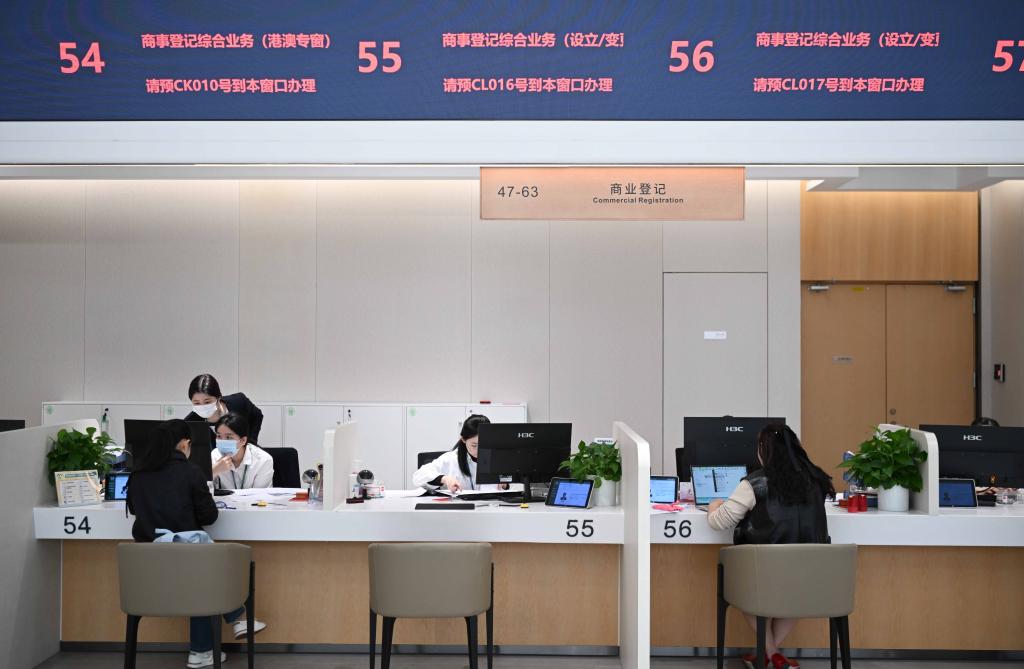Hengqin: Gateway for Going Global

The synergy and complementary strengths between Macao and Hengqin can create an important channel for Chinese companies to internationalize.
Chinese enterprises have placed much emphasis on going global in recent years, from traditional manufacturing giants to emerging tech unicorns, and from traditional sectors to emerging industries like electric vehicles, lithium batteries, and photovoltaic products. The enthusiasm to internationalize reached unprecedented levels in 2024.
The spillover of domestic demand and inflating demand in overseas markets are driving this surge. According to data released by China’s General Administration of Customs, in the first half of 2024, China’s total export value exceeded RMB 12 trillion, a year-on-year increase of 6.9 percent. Data from the China Association for Public Companies showed that over the period, listed companies in the domestic market achieved RMB 3.83 trillion in business earnings from their operation in overseas markets, a year-on-year increase of 12.84 percent, while the proportion of business income from overseas markets reached 10.98 percent, an increase of 1.39 percentage points.
The area for in-depth Guangdong-Macao cooperation in Hengqin, as an important driving force for growth in the Guangdong-Hong Kong-Macao Greater Bay Area, is poised to become a golden gateway for Chinese enterprises to expand overseas. This is thanks to its unique geographical location, policy incentives, and close ties with Macao.
New demonstration zone
Hengqin, with an area of 106.46 square kilometers, is 187 meters away from Macao and 34 nautical miles from Hong Kong in its closest part.
Xi Jinping visited Macao in January 2009 when serving as China’s vice president. Back then, he announced that the central government had decided to develop the Hengqin Island, in the process of which moderately diversified economic development of Macao should be taken into full consideration. The aim was to bring new development space and opportunities to Macao, to generate long-term prosperity, stability and development of Macao’s economy. The State Council issued the master plan for the development of Hengqin in August 2009, and four months later in December, the Hengqin New Area was officially established.
During his visit to Hengqin as Chinese President in December 2012, Xi encouraged Hengqin to further expand openness and exploration, and make contributions to the innovation of institutional mechanisms in the context of Guangdong-Hong Kong-Macao cooperation.
On the occasion of the 15th anniversary of Macao’s return to the motherland in December 2014, Xi placed high hopes on the young people, encouraging them to uphold the “one country, two systems” policy during his visit to the Hengqin Campus of the University of Macau.
In October 2018, Xi made his fourth visit to Hengqin, where he stressed that Hengqin has inherent advantages in promoting Guangdong-Macao cooperation. It is necessary to strengthen policy support, expand the space for cooperation and develop emerging industries to boost Macao’s economic development, Xi said.
On December 20, 2019, Xi attended the gathering marking the 20th Anniversary of Macao’s Return to China and the inauguration of the fifth-term government of the Macao Special Administrative Region (SAR). “What is particularly important for Macao is to ensure good collaboration with Zhuhai in developing Hengqin, which will create immense space and new momentum for Macao’s long-term development,” Xi said in his speech.

On September 5, 2021, a general plan for building the area for in-depth Guangdong-Macao cooperation in Hengqin, issued by the Communist Party of China Central Committee and the State Council, was made public. The plan defines the strategic position of the area as a new platform to boost Macao’s appropriate economic diversification, a new space that provides convenience to Macao residents’ life and employment, a new model to enrich the practice of “one country, two systems,” as well as a new high ground for building the Greater Bay Area.
Appropriate economic diversification is the only way to maintain Macao’s long-term prosperity and stability. This was always the original mission in Hengqin’s development and construction.
The administrative structure of the area is different from both that in Hong Kong and Macao, as well as that from the Chinese mainland. Its development and administration agency is jointly established by Guangdong and Macao, which makes overall decisions on major plans, policies, projects and the appointment and dismissal of important personnel. The agency is headed by a dual leadership made up by the Guangdong provincial governor and the chief executive of the Macao SAR.
The intersection point
Based on the overall situation of economic and social development and coordinating the overall domestic and international situations, China proposed accelerating the establishment of a “dual circulation” development pattern, which takes the domestic market as the mainstay while domestic and foreign markets boost each other.
Hengqin’s geographical location determines its unique role in the dual circulation. Within a radius of 100 kilometers, there are four international airports, one domestic airport, and four deep-water ports. Besides, one can access eight expressways and three rail transit lines within 30 minutes, basically achieving connectivity between major cities in the Greater Bay Area within 1.5 hours. It is connected to Hong Kong and Macao via the extension of the Hong Kong-Zhuhai-Macao Bridge and the Lotus Bridge, making it a rare inland area that serves as a hub linking domestic and international circulation. Its advantageous geographical location provides unique development conditions for Chinese enterprises to go global.
Furthermore, behind Hengqin is the economically developed Greater Bay Area. The total economic output of the Greater Bay Area surpassed RMB 14 trillion in 2023. The area, accounting for only 0.6 percent of the national land area, contributed over 11 percent to the country’s total economic output.
Meanwhile, Hengqin’s unique customs supervision policies have created a special tariff environment that will provide policy support for enterprises going global.
Hengqin started a new customs operation on March 1, 2024, which allows most goods to be moved there tax-free from neighboring Macao. This marks a crucial step in building a new system for integrated development with Macao and high-level opening-up. Hengqin has also become China’s first special area to implement this customs policy. Under the policy, the region between Hengqin and Macao is where goods move freely with no tariff being levied after a record is filed.
Apart from this, Hengqin has implemented a series of preferential policies to support companies going global.

The first is preferential policies for corporate income tax and individual income tax.
Since January 1, 2021, eligible industrial enterprises located in Hengqin have been offered with a 15-percent corporate income tax cut. The ceiling of individual income tax rate for urgently-needed professionals working in Hengqin is 15 percent of their incomes. For Macao residents working in Hengqin, their personal income tax will not exceed the amount they paid back in Macao. In comparison, the corporate income tax rate in other parts of the Chinese mainland is 25 percent, and the personal income tax rate can reach up to 45 percent. Hengqin’s tax policy can greatly reduce the operating costs of enterprises. For enterprises in sectors like tourism, modern services, and hi-tech industry companies in Hengqin, their earnings from newly added investment in overseas markets are exempt from corporate income tax.
The second is supportive financial policies.
China has implemented several financial innovation measures to support the development of Hengqin, such as canceling the special renminbi capital account and allowing direct purchase of foreign exchange with renminbi in paying for imports.
The third is a pilot program for cross-border flow of data in a free and safe manner. The fourth is talent incentives. Hengqin has introduced a series of new talent policies, covering support measures, including living allowances and project funding for high-level experts, innovative teams, overseas students, and industry personnel. This policy not only reduces the operating costs of companies, but also facilitates the attraction of talented personnel.
Linking the world
Boasting a unique historical and cultural background, Macao is a place where Eastern and Western cultures meet. It has established an extensive network of foreign contacts in long-term foreign exchanges.
So far, some 300 international conventions are applicable in Macao. The Macao SAR has also established stable economic and trade relations with over 120 countries and regions, and is a member of more than 190 international organizations and institutions, enjoying visa-free or visa on arrival policies offered by 145 countries and regions. Currently, 89 countries have consulates or offer consular services in Macao, and Macao has 14 economic and trade offices overseas.
Macao has a special and deep link with Portuguese-speaking countries in the world. With a population exceeding 300 million, Portuguese-speaking countries and regions are found across Europe, Asia, Africa, and South America, each with its own unique history and culture. Macao, due to its historical relationship with Portugal and geographical location, has become a platform for cultural and economic exchange and cooperation between China and Portuguese-speaking countries. The Forum for Economic and Trade Cooperation between China and Portuguese-Speaking Countries (Macao), also known as Forum Macao, is currently China’s only language-based multilateral cooperation mechanism.
Macao is an internationally renowned free trade port and a separate customs territory. With the policy advantages provided to Hengqin, the synergy and complementary strengths between Macao and Hengqin can create a golden channel for Chinese companies to go global. Through the linkage between Macao and Hengqin, on one hand, it can provide greater space for Macao’s development, consolidate its unique position and advantages, and deepen and expand its external exchanges. Conversely, it can also play a bridging role between Macao and Hengqin in connecting the Chinese mainland and international markets, promoting broader and more practical cooperation between China and Portuguese-speaking countries, and assisting in high-quality Belt and Road cooperation.
Zhu Jie is deputy general manager of Zhuhai Dahengqin Company Limited.
 Facebook
Facebook
 Twitter
Twitter
 Linkedin
Linkedin
 Google +
Google +










